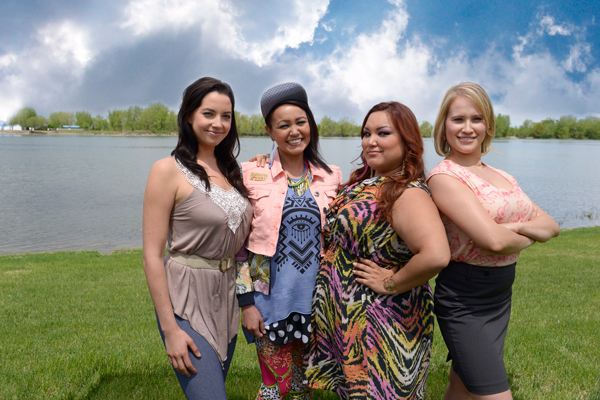
McGill grad caps first season producing Mohawk Girls television series
By Neale Mcdevitt
There is an adage that says writers write what they know. Cynthia Knight would beg to differ… kind of.
Knight is the head writer and one of the executive producers of Mohawk Girls, a new television series on APTN and OMNI that follows the lives of four twenty-something Mohawk women trying to find their place in the world.
So what does Knight, a Jewish Montrealer who attended Miss Edgar’s and Miss Cramp’s all-girl high school, know about life in Kahnawake, where the series is set? “At the beginning, not much,” laughs Knight, a McGill Arts graduate. “But I’m learning.”
Knight is learning the Kahnawake-specific details from her co-executive producer and the show’s creator, Tracey Deer, herself a Mohawk who grew up in Kahnawake and has gone on to make a name for herself as a television producer and film maker.
“Sometimes Tracey will help me with dialogue – especially when people are angry or insulting one another,” says Knight. “She’ll read over the script and say ‘we don’t speak like that.” Apparently my insults are too wimpy.
“Or I’ll have one girl getting angry with another and pushing her in the shoulder and Tracey will change it to ‘she punches her in the face,’” says Knight.
But the critically acclaimed show’s strength is that, while it very clearly focuses on life “on the rez,” it also tackles issues that have universal appeal.

“There are a lot of aspects of the show that are very specific to Kahnawake – the norms that are in place, the way people act, the expressions they use, certain issues that we on the outside do not relate to,” says Knight. “But while they are grappling with all these world-specific things, they are still trying to fall in love and find the right guy, which brings with it a whole set of new issues with respect to family and cultural pressure.
“I think anyone who comes from a minority culture can relate to certain issues such as community pressure, family obligations, choosing your own path in the world. You’re a dwindling people and if you don’t marry within your culture, your people run the risk of disappearing,” Knight continues. “However, it is a small town and a small pool, so do you do right by your people and propagate the nation or do you follow your heart? These issues resonate with lots of people regardless of their ethnicity or cultural background.”
A case in point, while APTN runs the show in English and Mohawk, OMNI airs it in English and Madarin. “It is ironic because we’re trying to show the diversity and complexity of this culture which, ultimately, just proves how we’re all pretty much the same,” says Knight.
One of the refreshing aspects of Mohawk Girls is that it portrays Aboriginals in a different light than often seen in mainstream media. “We hear all these stories about corruption on the reserve and alcoholism – and these are very important and difficult issues that people are struggling with – but there is so much more to this world and culture,” says Knight. “They have incredible community spirit and a wonderful sense of humour – tons of levity.”
Knight has a decent sense of humour herself, saying landing the gig on Mohawk Girls “saved” her from having to move to Toronto.
A graduate of the prestigious Canadian Film Center’s TV Writers’ Program, Knight has extensive experience as a writer, story editor and executive producer with in both feature film and television. But after years of honing her craft in Montreal, she was dismayed to find the work drying up. Like so many English-language industries, more and more film and TV jobs were moving down the 401.
“I was actually in Toronto to look for an apartment when I got a call from Tracey and the production company Rezolution Pictures asking me if I wanted to work on the pilot for Mohawk Girls,” says Knight. “I was schmoozing at the Film Festival telling everyone I was moving when they called me.”
Jumping at the chance, Knight cancelled her plans to move and began developing the pilot show with Deer. The pilot was shot in 2009 and aired in 2010.
Then they had to wait. And wait.
“Usually with a pilot, you get a fairly quick yes or no from the network. But APTN was already funding its big flagship show, Blackstone, and was committed to some other projects. We had to wait a couple of cycles before they had the resources to give to Mohawk Girls,” said Knight. “Finally – two long years later – we got green light for the development and production of the whole first season.”
But APTN was so enthusiastic about the project, the network asked for 13 episodes instead of the regular seven. “In this era in which everyone produces fairly short series, it is tough to get an audience to really engage. It takes a few episodes for them to get to know the world and the characters… and by the time they become more involved, the whole thing is over,” says Knight. “We were thrilled that the network wanted more episodes because we have some great stories to tell and this is the best way to showcase them.”
Mohawk Girls first aired in late November and the season finale will air this coming Sunday at 9 p.m. both on APTN and OMNI 1. People can watch the first 12 episodes of Mohawk Girls on the APTN website or on the OMNI website.
So far, the reviews have been good – despite what Knight says is a natural bias against local productions. “First of all, when you say it is a Montreal show and, second of all, a show about Native people, it is easy for people to just presume that it will be this small, low-budget show on a smaller network,” she says. “But reviewers have said we are a show with high production values that has something to say.
“APTN has allowed us to really push boundaries and be more edgy than one normally would be on network television and it is a great credit to them that the show isn’t watered down,” says Knight.
“We feel very honoured to be able to present this fresh take on Aboriginal people and we’d love for people to check it out and tell us what they think.”
